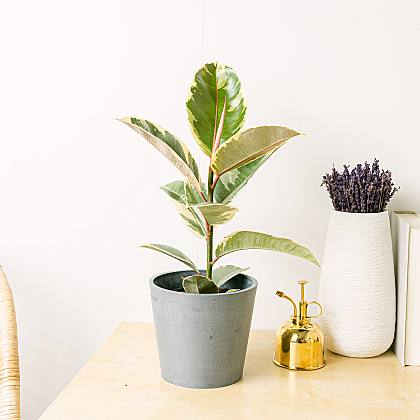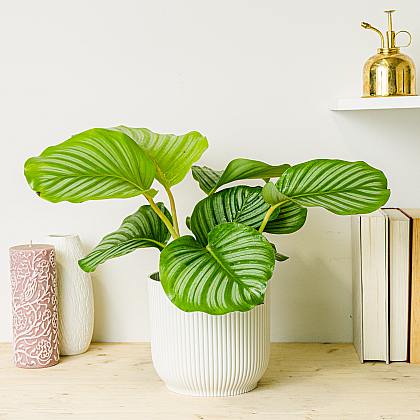Plant love despite pets: Here's how it works
Pets and houseplants can be a difficult combination. Many pets have a natural curiosity and are tempted to nibble on plants or knock them over. But that doesn't...
Pets and houseplants can be a difficult combination. Many pets have a natural curiosity and are tempted to nibble on plants or knock them over. But that doesn't mean you have to give up the joy of green houseplants. In this article, you'll learn how to protect your plants while creating a safe home for your pet. We take a look at poisonous plants that should be avoided and introduce hardy plants that can survive unscathed even by curious pets. We'll also share tips on how to care for houseplants in a pet-friendly home and introduce alternative methods of keeping plants. Read on to find out how to achieve a harmonious relationship between your houseplants and pets.
Pets and houseplants: a difficult relationship?
Pets and houseplants often have a difficult relationship with each other. Many pets, especially cats and dogs, are naturally curious and like to explore their surroundings. It can happen that they nibble on the houseplants or dig up the soil with their paws. Unfortunately, some houseplants can be toxic to pets and lead to health problems. That's why it's important to make sure that houseplants are safe for pets when choosing them. In addition, you should protect your plants from curious pets by placing them out of reach or securing them with barriers. Alternatively, you can switch to vertical gardening or hydroponics to keep your plants out of the reach of pets. If you still want to keep houseplants close to pets, there are some care tips to consider. This includes, for example, regular watering to prevent the animals from playing on the damp soil. Removing dead leaves and fertilizing regularly are also important measures to maintain the health of the plants. With a little caution and the right choice of houseplants, it is quite possible to create a harmonious coexistence between pets and plants in your own home.
Poisonous houseplants: which plants are dangerous for pets?
Some houseplants can be dangerous for pets. Most pet owners don't realize that some plants can be toxic to their pets. Some of these poisonous plants are: the ivy, the unicorn, the rubber tree, the philodendron, the green lily and the poinsettia. The ivy bag is poisonous to cats and dogs and can cause symptoms such as vomiting and diarrhea. It is also toxic to cats and dogs and can cause symptoms such as irritation in the mouth area, difficulty swallowing, and vomiting. The rubber tree is toxic to dogs and cats and can cause symptoms such as irritation in the mouth area, vomiting and diarrhea. Philodendron is toxic to dogs and cats and can cause symptoms such as swelling in the mouth area, difficulty swallowing, and shortness of breath. The green lily is toxic to dogs and cats and can cause symptoms such as vomiting and diarrhea. Poinsettia is poisonous to dogs and cats and can cause symptoms such as irritation in the mouth area, vomiting, and diarrhea. There are many other plants that can also be toxic to pets. It's important for pet owners to educate themselves on which plants in their home or garden can be dangerous to minimize the risk of poisoning. If poisoning is suspected, pet owners should consult a veterinarian immediately.
Choosing the right plants: robust and pet-friendly houseplants
When choosing houseplants for households with pets, it is important to choose hardy and pet-friendly plants. These plants are able to survive the occasional tumult of curious pets without being harmed. Hardy houseplants such as the green lily, kentia palm, and money tree are good options because they are resistant to accidental nibbling or knocking down. However, it is also important to note that some plants can be toxic to pets. Therefore, owners should make sure to choose non-toxic plants. Pet-friendly plants include, for example, the spider plant, the areca palm, and the Boston fern. Not only are these plants safe for pets, but they can also help improve indoor air quality. When choosing houseplants, it is advisable to learn about the specific needs of the plants and make sure that they are compatible with the living conditions in the house. In this way, you can ensure that both the pets and the houseplants can live together in harmony.
Care tips for houseplants with pets in the house
If you have pets in the house and want to care for houseplants at the same time, it's important to keep some care tips in mind to ensure that both your plants and your pets stay healthy. First of all, you should make sure that your houseplants are in a place that is inaccessible to pets. Avoid placing plants near climbing opportunities or in areas that can be easily reached by curious pets. In addition, it is advisable to completely remove poisonous houseplants from your home, or at least place them out of reach of your pets. Research the specific types of plants that can be dangerous to your pets and make sure they are out of their reach.
Another important tip is to check your houseplants regularly and detect any damage or signs of disease early. Pets can sometimes nibble on the leaves or dig at the plants, which can cause damage. Make sure your plants get enough water and light to stay healthy. At the same time, you should make sure that no toxic substances such as fertilizers or pesticides are within reach of your pets.
By following these care tips and taking precautions, you can enjoy your houseplants while ensuring the safety of your pets. Keep in mind that thorough research on poisonous plant species and careful placement of your plants are crucial. With a little caution and attention, you can create a harmonious balance between plant love and pet ownership.
How to protect your plants from prying pets
If you want to protect your houseplants from curious pets, there are some practical tips that can help. First of all, it is important to place the plants out of the reach of your pets. Place them on raised surfaces or use shelves to make sure your furry friends can't nibble on them or knock them over. Another way to protect your plants is to plant them in hanging pots or baskets. This way, you can keep them out of reach of curious paws or beaks. Another trick is to surround your plants with a fine trellis or decorative fence. This can prevent your pets from nibbling on them or getting too close to them. If your plants can still be reached by your pets, you should educate yourself on pet-friendly plants. There are many hardy and non-toxic houseplants that are a great choice for households with pets. Some examples include green lilies, bromeliads, and money trees. By following these tips and choosing pet-friendly plants, you can ensure that your plants remain protected while creating a green environment for you and your pets.
Alternatives to traditional plant farming: vertical gardening, hydroponics, and more
An alternative way to keep houseplants is through vertical gardening. In this method, the plants are placed on the wall or on a special rack to save space and at the same time create a green atmosphere in the room. Vertical gardening is especially good for small rooms or apartments without a garden. There are different systems that can be used for this type of plant cultivation, such as vertical wall gardens or plant bags that can be attached to the wall. These systems make it possible to grow multiple plants in a small space and provide a creative way to incorporate green accents into the interior.
Another alternative is hydroponics. Here, the plants are not kept in conventional soil, but in a water-based nutrient mixture. The roots of the plants absorb the nutrients they need directly from the water. Hydroponics has the advantage of requiring less maintenance than traditional plant farming. There are special hydroponic pots and systems that provide plants with an optimal supply of water and nutrients.
In addition to vertical gardening and hydroponics, there are other alternatives to traditional plant farming. These include, for example, terrariums or aquariums with aquatic plants, hanging baskets or artificial plants. These options offer a variety of ways to make the home green and vibrant despite pets.
It is important to note that each of these alternatives has its own advantages and disadvantages, and that not all houseplants are suitable for these methods. Therefore, before choosing an alternative, it is important to find out about the needs of each plant and make sure that you can create the right conditions for it to grow.
Conclusion: A green home despite a pet - this is how it works!
Having a green home despite having a pet is possible, but it requires some precautions. To ensure that the plants in your home are safe and your pets are protected from harm, you need to choose the right plants and follow some simple care tips. A great way to protect your plants is to store them on higher shelves or in hanging baskets to prevent pets from reaching them. However, if you don't have taller shelves or if your pet is particularly curious, you may want to consider using a vertical garden wall or hydroponic systems. There are also plenty of pet-friendly houseplants to choose from, including spider plants, bamboo, and ferns. It is important to note that some plants can be toxic to pets. Therefore, it is advisable to do some research before buying plants and make sure they are safe for your pets. By choosing the right plants and taking some simple precautions, you can enjoy a green home while keeping your pets safe.
If you have a pet and still don't want to do without houseplants, you can reconcile this with the right choice and care. It's important to research poisonous plants ahead of time and choose hardy, pet-friendly plants. Creating alternatives such as vertical gardening or hydroponics can also be a good option. With some care tips and tricks, houseplants can thrive even in a household with pets. However, it is also important to consider the needs of the pet and ensure that it does not pose a threat to the animal's health. Ultimately, it is a question of balance and compromises may have to be made. An interesting reflection would be to think about how our relationship with nature and pets are connected, and how we can reconcile these two aspects in our daily lives


